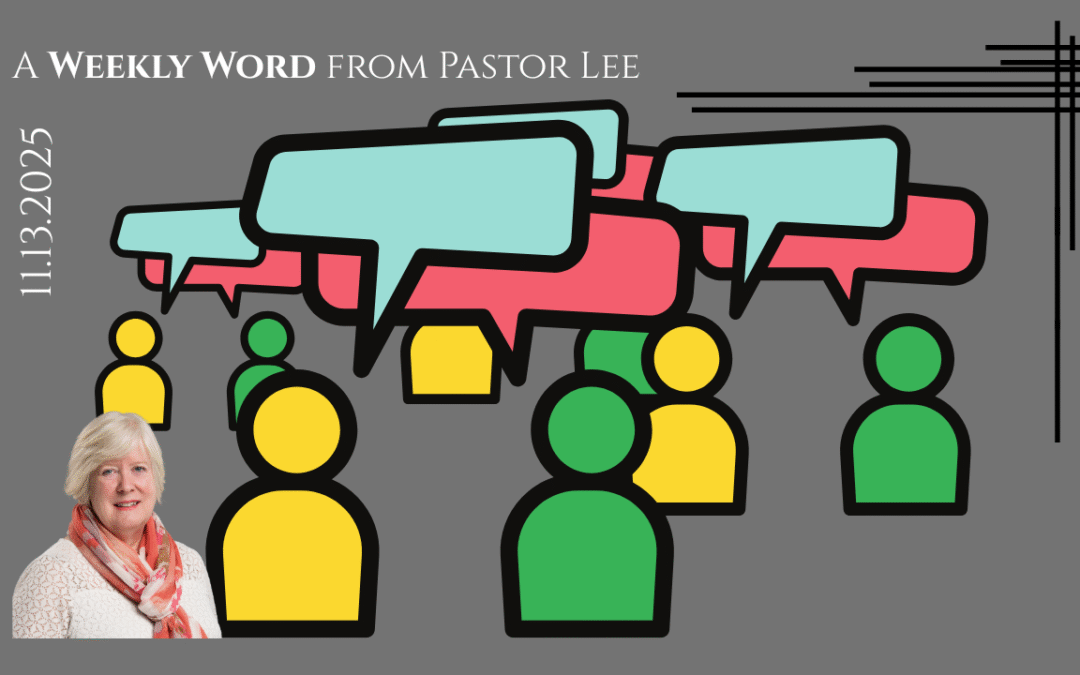I found myself in a funny email exchange with our music director, Patrick Gagnon, this week. I had suggested an opening hymn for this Sunday, and I wanted Patrick’s thoughts on it. The hymn is “O Day of Peace That Dimly Shines” (UM Hymnal # 729); the words are terrific, closely connecting to our Days Are Surely Coming theme. But the hymn tune wasn’t familiar to me. (This is unusual; I know most of the hymns!) So I suggested using an alternative tune that might help us open worship with more energy.
Patrick replied that he thought this church would be familiar with the tune, so we left it at that—with the possibility of sending out a link that might help our community get familiar. I sent back this link—which is from a small church singing this very hymn—along with this one, which is a huge event in Britain in which a whole auditorium sings this tune using a different (patriotic, I think!) set of words. (I encourage you to listen, if you want to be ready!)
And then Patrick sent me this excerpt from the movie Four Weddings and a Funeral, where the first wedding begins with this same tune! It was a fun connection that I would never have picked up on.
It got me thinking about how often I end up talking about things in a day that I never expected.
For several months our Roundtable small group, which I lead, has been having conversations about the book we’ve just finished, God After Deconstruction, by Thomas Jay Oord and Tripp Fuller. We’ve had important conversations about how the church, writ large, and specific churches, have taught us about God, and about ourselves, and faith, and more. And about how some of those teachings no longer matches what we believe.
We probably all know (or have been) people who’ve deconstructed to the point that they no longer believe God exists. Deconstruction looks different for all who find themselves doing it. I wonder if open and generous conversation offered to some of those friends and acquaintances might have helped them see a broader range of authentic, meaningful ways of understanding who God is and what faith in that God might look like. I’m not sure we’ve always been willing to pick up on the clues, and actually speak into those questions and doubts. I want to be better at that. I hope I’m getting better at that.
In recent weeks we’ve baptized two infants and afterwards I heard from folks who wondered why we didn’t use the version at the back of the hymnal, which was crafted by members and leaders here at Collegiate/Wesley more than two decades ago. I reached out and we’ve scheduled a time to talk about that. (If you should be part of that conversation, please be in touch with me.)
Part of my work that I truly love is the range of things I end up talking about. It matters. Our conversations are important. It’s never boring.
In the last two days, I’ve talked to people in and/or beyond CW about
- boiler systems here in the church and at Wesley Place and how they work and the craziness that ensues if they run out of water; **Not to worry; I’m told there are safeguards and backups that keep this from happening!**
- what we’re learning about the Gen-Z and Generation Alpha and how that might affect our campus ministry, and our ministry among young people;
- whether it’s actually true that The Days Are Surely Coming when God will bring all things to completion and peace, especially given (as my conversation partner said) the absence of all evidence to support that idea;
- people’s relief at ISU’s choice of their next president;
- how a friend might be able to publish and market her book about her experience with Dissociative Identity Disorder (DID), which used to be called Multiple Personality Disorder, and how she can find her audience, and how we at CW might be part of it;
- the “fangirl” response someone had to my own book, Foolish Church (which hasn’t happened for a long time!), that I stumbled into because of an unexpected, last-minute, silent auction gift for Sunday’s AMOS Variety Show; and
- so many more.
What are you talking about? What more or deeper or different would you like to be true about the conversations you’re having? Could some of those opportunities be part of what we’re doing here at CW?
The Roundtable group decided today that, from January through the spring, we’ll be talking about Christian nationalism, based not on a book but on a lecture series that happened at Candler School of Theology last month. It’s a conversation that will help us, I think, understand more about this cultural and religious moment we’re in right now. We’d love to have you join in the listening, and the talking. (We’ll share about how, soon!)
What else do you want to talk about? What isn’t on the table that needs to be? I’d love to hear from you.


